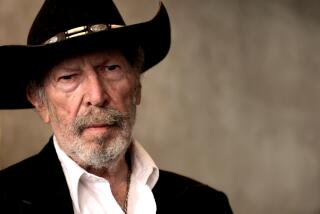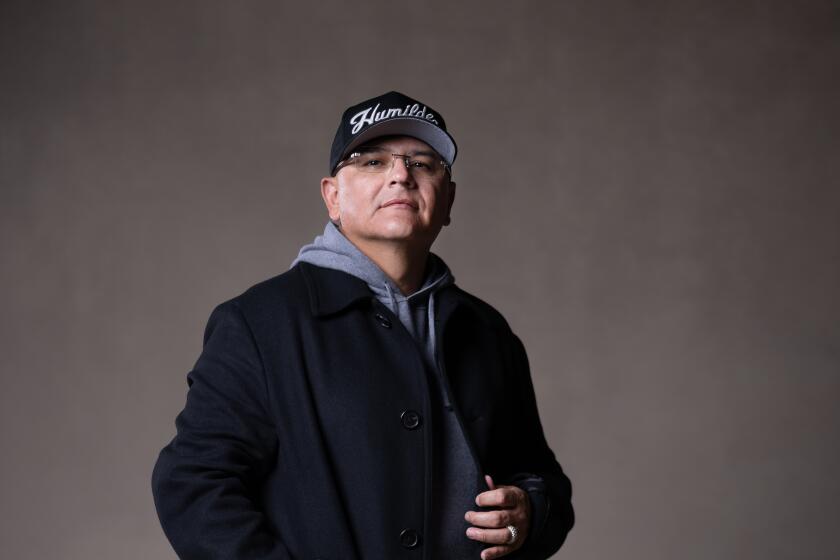Keeper of the Keys : Pianist Nicky Hopkins Brings Impressive Resume to Coach House
Nicky Hopkins may not hold the keys to the Rock and Roll Hall of Fame, but most of the hall’s British members entrusted the keys to him on famous recordings that helped get them inducted.
This accomplished session pianist isn’t exactly a marquee name, but he has one of the most remarkable resumes of any player in rock. By 1968, he had completed the Grand Slam of English Rock, having played on records by the four greatest bands of the British Invasion: The Beatles, the Rolling Stones, the Kinks and the Who.
The Stones, in particular, tapped his talents. Hopkins played on each of their studio albums from “Their Satanic Majesties Request” in 1967 to “Black & Blue” in 1976. His work also appears on the early ‘80s Stones albums “Emotional Rescue” and “Tattoo You.”
He completed his second Grand Slam in 1989, after working on Paul McCartney’s “Flowers in the Dirt,” he had credits on albums by all four ex-Beatles--including most of the piano playing on John Lennon’s “Imagine” LP.
Though mainly a free-lancer, Hopkins did enlist for short stints as a full-fledged member of the Jeff Beck Group and Quicksilver Messenger Service. He performed at Woodstock with the Jefferson Airplane, who had recruited him to play on “Volunteers,” another Hall of Fame-quality album.
Nowadays, based in Encino, he concentrates mainly on soundtrack work and songwriting, although he keeps his hand in as a session pro. He lent that classic Stones touch to a ballad on the new album by former Guns N’ Roses guitarist Izzy Stradlin and says he recently played some sessions for Rod Stewart, an old crony he first teamed with in the ‘60s on two excellent Jeff Beck Group albums, “Truth” and “Beck-Ola.” He also will be featured on an upcoming album by Matthew Sweet.
Hopkins will escape the studio and play at the Coach House in San Juan Capistrano on Sunday, appearing with the Flew, an informal new band that also features singer-guitarists Joe Walsh (of James Gang, Eagles and “Rocky Mountain Way” fame) and Terry Reid (another veteran of the ‘60s British rock scene).
The most impressive thing about Hopkins’ career isn’t simply the range and prominence of his credits. It’s that, given the title of a classic track he played on, many rock fans can readily hear his piano parts sounding in their heads.
Take “Sympathy for the Devil,” the leadoff song on the Stones’ greatest album, “Beggars Banquet” (its back cover bears the notation: “We are deeply indebted to Nicky Hopkins and to many friends”).
The song’s distinctive tribal percussion, throbbing bass line and hooting vocal chant are its propulsive engines. But Hopkins is the rocking, rolling wheel, the basis of the song’s entire motion. He intones its first chord and never stops playing, all the way through to the jangling piano fade.
He is especially brilliant in his accompaniment to Keith Richards’ terse, ferocious lead guitar break, trilling wicked dances around the guitar’s murderous thrusts, heightening the song’s tone of mockery and disgust for humanity’s eagerness to bargain with evil.
On the single version of “Revolution,” his lone credit with the Beatles as a group, Hopkins plays a compulsive, circling pattern during the instrumental break. It sounds like a crazily accelerating clock, underscoring the song’s point that violent revolutions don’t lead to change, but merely perpetuate a cycle of horrors.
You can hear his exuberant jangle on the Stones’ “Tumbling Dice,” his stately grace on the Who’s “Song Is Over,” his heraldic drive on the Airplane’s “Volunteers” and “We Can Be Together,” his gleaming luster on the Stones’ “Time Waits for No One” and his elegant ballad touch on Lennon’s “Jealous Guy,” the Stones’ “Angie” and Joe Cocker’s “You Are So Beautiful.”
Hopkins, who turned 49 on Wednesday, says he isn’t exactly sure why major stars started calling on him for sessions in the mid-’60s.
“It was really the blues approach they wanted on the piano, and I think I had a knack of coming up with what they wanted,” he says in a characteristically mild voice.
“Half the time they didn’t have an idea” exactly what they wanted played. “They only knew they wanted a piano. Later, there was a specific sound people wanted and expected if they booked me. I’d say it was basically a good rock ‘n’ roll piano, with some classic blues overtones.”
He recalls that his famous employers typically didn’t give him detailed instructions on how he should play, leaving it up to him to come up with parts.
“The only time everything was spelled out, Mick (Jagger) had the melody for ‘She’s a Rainbow’ and said, ‘If you can do a classical intro on the piano.’ I just took it from there.”
He grew up in the suburbs of London. His mother played the piano, and by the age of 3 he was picking out melodies on the keyboard. He began lessons at 6, played in school, and from the age of 12 to 16 was enrolled in a weekly classical piano program at the Royal Academy of Music. Meanwhile, rock ‘n’ roll began to seep into the wide mix of music he was hearing.
“When I was 11 or 12, my sister brought home a 78 by Fats Domino, ‘Ain’t That a Shame,’ and I loved it. In the next few years, I started listening to Little Richard and a few others. I didn’t actually start emulating those guys then. It was all a mystery.”
Rock ‘n’ roll became less mysterious when he joined his first band at 16. Screaming Lord Sutch and the Savages were fronted by a howling bandleader who jumped around a lot in a leopard skin suit. “Sutch and the drummer were avid record collectors and they turned me on to a bunch of stuff I’d never heard--Muddy Waters, Bo Diddley, Chuck Berry and Howlin’ Wolf. This was all underground music in Britain at the time. Nobody had heard it. It was all word of mouth.”
In 1962, Hopkins landed in a band led by singer Cyril Davies, one of the founding fathers of the British blues scene. But he missed out on the first wave of popularity for British rock ‘n’ roll. While the Beatles, Kinks and Rolling Stones were taking off in 1963-64, Hopkins was hospitalized for a year and a half, suffering from “a lot of internal problems.”
When he regained his health, he began making up for lost time. Working a low-profile session produced by Jimmy Page, he caught the ear of engineer Glyn Johns, who passed the word on to producer Shel Talmy, who enlisted Hopkins to play on the Who’s debut album, “My Generation.” Talmy also produced the Kinks and brought Hopkins in on sessions for such marvelous mid-’60s albums as “Face to Face” and “Something Else.”
“Face to Face” finds him trilling merrily on harpsichord through a song called “Session Man,” a delightfully catty ditty about a blase musician for whom playing is just a job:
He reads the dots and plays the lines,
and always finishes on time.
No overtime or favors done....
He’s not paid to think, just play.
A session man.
Kinks fans long have assumed that Ray Davies wrote it as a cockeyed tribute to Hopkins. “Not guilty,” the piano player says. “Everybody thinks that, and it wasn’t.” At the session, he recalls, “I asked, ‘What the (expletive) is this about?’ Ray Davies said ‘It’s about this cello player who came in the other day.’ Unfortunately, I played on the bloody thing and I’ve been stuck with it ever since. I guess it adds to the mystique.”
When the Rolling Stones began to experiment with more complex music in 1967, they called on Hopkins.
He says there was no touchiness in his relationship with the late Ian Stewart, the “Sixth Stone” who often had accompanied the band on piano and served as its all-purpose right-hand man when not performing.
“Stew was a brilliant blues and boogie-woogie pianist, but outside of the 12-bar framework, he was a bit lost. He really was a specialist; he had never learned to play anything else. When it got on to ‘Satanic Majesties,’ with all sorts of different chord changes,” the Stones turned to Hopkins. “Stew was always fine with that.”
From 1965 to 1968, Hopkins was the dominant session man in London. “I had it to myself. There were few (piano) players who could read music, and the ones who could were the old school who couldn’t play rock ‘n’ roll. So I had the whole thing sewn up. It was a great time.”
He also played middle-of-the-road pop sessions behind Peter & Gordon, Tom Jones, Engelbert Humperdinck, Dusty Springfield and others. In 1966, he took a stab at lush, Peter Nero-style playing with his first solo album, “Revolutionary Piano.”
“For a while, the challenge was to see how much I could do, how much I could push myself,” says Hopkins, who self-deprecatingly describes himself as lazy by nature. “I think it had something to do with the year and a half I was in the hospital. I wanted to see how far I could push myself and get away with it.”
He says he later applied the same zealousness to taking drugs, which necessitated a 1979 stay at Narconon, a rehab center in Los Angeles. During his drug period, “for the most part I was able to keep it fairly together” as a player. “There were one or two times I didn’t, but I’m not alone in that. It just got so bad, I went into drug rehabilitation and got off it that way.”
In 1968, he decided he’d had enough of the session grind in London. “I thought, ‘OK, the next band that asks me, I’m going to join them and go and tour the States.’ Two bands did. Jeff Beck asked me to join his group, and Jimmy Page phoned up at the same time with the New Yardbirds. Jeff Beck had already done a tour of the States so I went with Beck. Definitely a wrong move, because the New Yardbirds turned into Led Zeppelin.”
(He notes that Terry Reid, his new band mate in the Flew, also was offered a gig in the Zeppelin-to-be, as singer, but turned it down and suggested Robert Plant instead.)
Life on the road with the Jeff Beck Group wasn’t easy: “We weren’t getting paid, and Beck kept disappearing in the middle of the night and going back to England to work on his cars.” By that time, Hopkins had fallen in love with San Francisco. He quit Beck’s band, moved to the Bay Area and in short order was immersed in its active rock scene, playing on albums by the Jefferson Airplane and the Steve Miller Band and serving a one-year hitch in Quicksilver Messenger Service.
He spent the ‘70s dividing his time between England and the West Coast, keeping up an active session schedule, and accompanying the Stones on three tours. He also released two more of his own albums, “The Tin Man Was a Dreamer” and “No More Changes.”
“I had a lot of song ideas I wanted to get out. I did some singing, but I wasn’t comfortable,” he says of his brief stab at a career in the spotlight.
After two marriages, he moved back to England full time in the mid-’80s. But a year ago, intent on pursuing opportunities in film scoring, he returned to Los Angeles (he says he didn’t realize he’d moved in next door to Tom Petty until his bottled water deliveryman informed him there was a rock star in the neighborhood--not realizing that Hopkins himself was no stranger to being in close proximity to rock royalty). He says he was busy last year with several soundtrack projects for Japanese television. He also played a few concert dates in Florida with a band called Tumbling Dice led by Mick Taylor, the former Stones guitarist.
“To be honest, I’m more comfortable in the studio situation” than in concert, he says. “It really depends on who I’m on stage with. If people start taking themselves seriously, I tend to withdraw.”
He met Joe Walsh for the first time last year when they both played a session for a beer commercial. The Flew--Hopkins, Walsh, Reid, drummer Phil Jones and Walsh sideman Rick “The Bass Player” Rosas--will be playing its first shows this weekend, with two gigs in Las Vegas preceding the Coach House concert.
“We just run through whatever songs we feel like--some of Joe’s, some of Terry’s, some from old records we all like. We might work up my instrumental ‘Edward’ (“Edward the Mad Shirt Grinder,” a 9 1/2-minute epic he composed for Quicksilver). The Flew will get together and do something whenever we can all do it. I don’t know how far it’s going to go, but as long as it feels good, we’ll do it.”
Despite his scores of musical relationships, Hopkins says he has not formed close friendships with other musicians.
“I have more acquaintances than real close friends. I know so many people, but I’m not one to hang out. I’ve never been the really social type--what a depressing note. If anybody (was his close friend), it was John Cipollina,” the Quicksilver guitarist who died of emphysema in 1989. Besides being his band mate, Cipollina had shared Hopkins’ passion for collecting coins, antiques and assorted other stuff, especially tin containers bearing the logos and advertising slogans of various products.
As near as he can tell, Hopkins has played on about 120 albums. He has worked for the obscure (Poet and the One Man Band, the Nervous Eaters) as well as the great (besides his host of credits with ‘60s rock icons, he has played sessions for Ella Fitzgerald and Fats Domino). The album he wishes he could have played on, but didn’t, was Bob Dylan’s “Blonde On Blonde.”
He says he had no idea that records he was helping to make more than two decades ago would have such enduring appeal.
“Back in the ‘60s, none of us knew we were building this vast repertoire of what is now considered the golden age of rock ‘n’ roll. Doing ‘Beggars Banquet,’ we were enjoying it, but we knew this record would be superseded by another in a year’s time. We thought it would be forgotten and never listened to again.”
The Flew plays Sunday at 8 p.m. at the Coach House, 33157 Camino Capistrano, San Juan Capistrano. $19.50. (714) 496-8930.
More to Read
The biggest entertainment stories
Get our big stories about Hollywood, film, television, music, arts, culture and more right in your inbox as soon as they publish.
You may occasionally receive promotional content from the Los Angeles Times.







